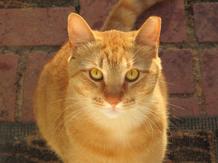Feral cats (AKA Community Cats) are the offspring of lost or abandoned pet cats or other feral cats who are not spayed or neutered. Feral cats typically live in a colony, a group of related cats, and the number of cats rapidly increases without intervention by caring people. Many don't survive. If they do survive, their lives aren't easy without human caretakers. Females may become pregnant as young as 5 months of age and may have two to three litters a year.
Trap-Neuter-Vaccinate-Return is a non-lethal strategy to reduce the number of feral cats and improve the quality of life for cats, birds, wildlife, and people. At a minimum, feral cats who are TNVRed are spayed or neutered so they can no longer reproduce, vaccinated against rabies, and surgically ear-tipped on one ear (ear-tipping is the universally-recognized sign of a cat who has been TNVRed). Dedicated caretakers feed and provide shelter for TNVRed cats, monitor the TNVRed cats for sickness and remove new cats for TNVR if feral or possible adoption if tame. Stabilizing the colony through TNVR is believed to be the most effective method of preventing Feral Cat overpopulation.
|
Humane Trap Depot
St. Augustine Humane Society maintains a Trap Depot that can be accessed by Feral Cat colony caregivers. With a fully refundable deposit, the caregiver may borrow our traps to catch feral cats for TNVR purposes only. We will be happy to demonstrate the procedure for trap operations.
|
 |
| feral cat ear tip |
|
|

Feral Cat Service | Our Spay Neuter Clinic assists colony caregivers in their efforts to fix Community Cats by providing a humane trap depot and offering special package pricing. Th Feral Cat package includes surgery, rabies & distemper vaccinations, ear-tipping ......all for one low price of $45. Please click on the PDF document to the left for a more detailed description of this service.
|
| How to Socialize a Feral Kitten:
During your TNVR efforts, you might encounter litters of young kittens along with a feral mother. Of course it's important to get the feral mother cat fixed and returned, but it is always preferable to get those babies into adoptive homes. If they are young enough, they can be socialized to become great pets. ASPCA provides a training guide for socialization. CLICK HERE to get started.
|
|